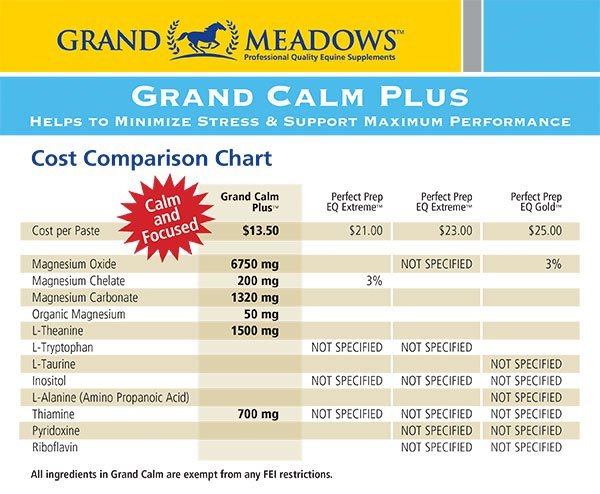Horse Calming
How to Calm a Nervous Horse
Learn tips on calming an anxious horse
Your horse won’t stand still. Your horse is grinding their teeth. Your horse won’t eat or drink. Your horse won’t sleep but is yawning. Your horse has very wide eyes and flared nostrils.
Your horse is not behaving like your horse.
This is both worrying and frustrating. The good news is that you notice these behavior changes. There is a strong likelihood that your horse is nervous, stressed, or anxious. Like us humans, it doesn’t take a lot for this to happen.
Something is causing your horse to behave differently, and you may be wondering how to calm a nervous horse in this situation. Many people assume a horse calmer is their only option. And while horse calmers can work – it’s important you first rule out any underlying conditions or scenarios that could be causing a behavior change in your horse.
Please do not make any changes to your horse’s diet, exercise habits, or supplement routine without first speaking to your veterinarian and trainer.
How to Help Calm A Nervous or Anxious Horse
Horse calming supplements may help in calming an anxious horse. But first, you should take a closer look at your horse’s general health and wellness routine.
1. Is your horse nutrient-deficient?
Magnesium, L-theanine, and thiamine are often overlooked in horse nutrition. These three nutrients play key roles in helping support your horse’s mood and behavior.
Talk to your vet about measuring the levels of these key nutrients. If you’re wondering how to calm a nervous horse, understanding their nutrient levels can be a good starting point. A horse low in thiamine might be jumpy or spooked easily. A magnesium deficiency may cause nervous behavior and muscle tension. L-theanine can help encourage a relaxed but alert mental state.
Watch this video: Over-Supplementing Your Horse. Learn more about horse nutrition and things to think about when assessing your horse’s diet.
2. How much exercise does your horse get?
Each horse is different, but in general, your horse should be moving for close to 20 hours a day. If you’re looking for tips on how to calm a nervous horse, remember that, just like us, horses can get edgy and stressed when they don’t have the opportunity to move and burn off energy.
Make sure your horse is not standing in their stable too much, as movement is essential for calming an anxious horse. Ensure your horse is getting enough turnout, providing them with the freedom to move and release energy. And also, make sure you’re not over-exercising your horse – fatigue can make your horse stressed and nervous.
3. When was the last time you checked for tack fit?
Too tight or too loose tack can cause your horse to be uncomfortable. A tight saddle can cause chafing, back discomfort, pinching, and saddle rolls. A poorly fitting bridle can cause breathing problems and neck issues. Tack that is too loose can cause blisters, rubbing, and injuries.
If you’re wondering how to calm a nervous horse, start by checking the fit of their tack. Poorly fitting tack can cause your horse to react like a nervous or stressed horse. Your horse may make it difficult to put the tack on or even run away from you. Pay attention to the signals your horse is giving you.
4. What is your horse eating?
How much grain are you feeding your horse? The sugars and starches in grain can be giving your horse too much energy. Watch To Grain or Not to Grain to learn more about how grain impacts your horse.
Make sure you carefully read the labels on everything you feed your horse. If you’re researching how to calm a nervous horse, it’s essential to look for the NASC Product Seal on all supplements. And never ever choose a supplement that doesn’t list all of their ingredients or explain why the ingredients are included.
Start with these four questions and talk to your veterinarian or trainer about your horse’s behavior. If everything checks out, then, with your veterinarian’s support, you may want to look into horse-calming supplements.
FEI Legal Calmer Ingredients
These three key horse calmer ingredients are known to help in calming an anxious horse. They are FEI legal and exempt from FEI restrictions:
1. Thiamine
Also known as vitamin B1, thiamine is essential to multiple enzyme systems. Thiamine supports carbohydrate metabolism, promotes a healthy appetite, and has an active role in the nervous system.
2. L-Theanine
This amino acid may help raise serotonin and dopamine levels, contributing to a more relaxed and calm horse. L-Theanine supports alpha brain waves, contributing to a relaxed but alert mental state.
3. Magnesium
Magnesium is essential for the creation of hormones that regulate the adrenaline response, helping keep your horse calm. A magnesium deficiency may result in muscle tremors, loss of appetite, an increased respiratory rate, and aggressive, anxious, stressed, or nervous behavior.
Always read the ingredients for any supplement you feed your horse. If you’re exploring how to calm a nervous horse through supplements, make sure any supplements you choose are FEI-legal if you compete. The FEI has clear information about prohibited substances for both horses and riders – make sure you are familiar with this information.
The Three Types of Horse-Calming Supplements
In calming an anxious horse, your horse calming supplement should include herbal formulas, nutrient-based formulas, and calming supplements specific to moody mares.
1. Nutrient-Based Horse Calmers
The focus for nutrient-based horse calmers is on delivering nutrients to support a healthy nervous system. If you’re wondering how to calm a nervous horse, these nutrient-based horse calmers can be ideal, most especially if your horse has a nutritional deficiency or struggles to get enough nutrients.
If you compete in rated events, nutrient-based supplements are your only approved and legal supplement option.
Key ingredients in nutrient-based horse calmers include thiamine, l-theanine, and magnesium. Always discuss the ingredients in horse calmers (and all supplements) with your veterinarian.
It may take up to six weeks for your horse to respond to nutrient-based horse calmers.
2. Herbal Horse Calmers
Primary ingredients in herbal horse calmers include hops, vervain, passion flower, valerian, and chamomile. Herbal horse calmers are not approved for competition in rated events. It can take up to six weeks for herbal horse calmers to take effect.
3. Moody Mare Horse Calmers
The changes in your mare’s hormones during the heat cycle may cause behavioral changes. If you’re looking for solutions on how to calm a nervous horse during this time, it’s important to consider that your mare may be experiencing intense discomfort in her reproductive and digestive tract, making it difficult for her to remain happy, calm, and focused.
Moody mare horse calmers are typically herbal-based, and the ingredients may include cramp bark, raspberry, and vitex agnus castus.
If your mare is showing signs of discomfort or not acting like herself, discuss this with your veterinarian. In calming an anxious horse, it is critical you talk to your veterinarian before giving your mare horse calming supplements.
Watch Fireside Chat – Calming Supplements to learn more about how horse calming supplements may be used, prohibited ingredients, and ingredients proven to show the most consistent results.
Horse Calming Supplements Comparison Chart
It can be challenging to choose the right calming supplement for your horse if you’re unsure how to calm a nervous horse effectively.
Use this horse calming supplement comparison chart to quickly review your options based on ingredients and cost.

Helping Your Horse Feel Their Best
Health and happiness go hand-in-hand. Your horse uses their behavior to communicate with you. Pay attention and be attentive to the signals your horse is giving you.
Number one rule in calming an anxious horse – do not panic. Contact your veterinarian if you notice any changes in behavior. It is important to have a complete understanding of your horse’s health and what may be causing changes.
Remember, your actions could also be triggering behavioral changes.
A horse calmer may help your horse – but first, rule out any external factors that could be causing your horse to behave differently.
If you have more questions about how to calm a nervous horse, the ingredients we use in our horse supplements, or questions about horse health and horse supplements – contact us. We are here to help you.

